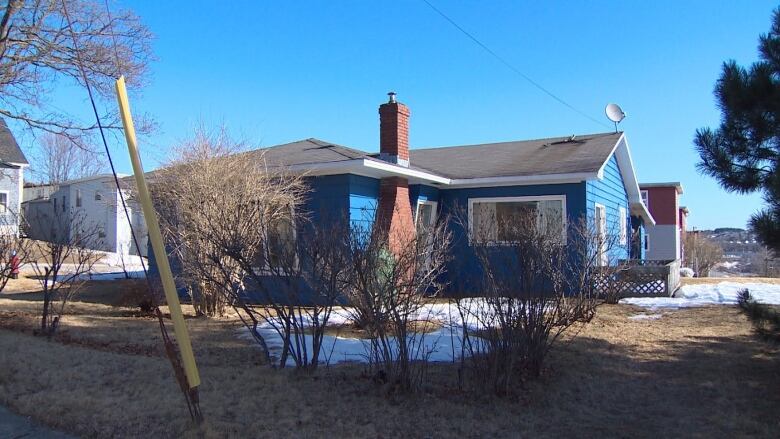'It doesn't make sense': Large property tax hikes defy law
Province admits 2,400 'miscalculations', apologizes for inconvenience

Records show numerous homeowners who undertook no renovations on their properties in 2016 were hit with tax increases above 10 per cent — contrary to a law that forbids large tax hikes, no matter what happens with assessments.
Margaret Penchoff lives in a three-year-old home on Saint John's west side and saw her tax bill jump $1,274 (36.1 per cent) this year. That's more than triple the increase allowed by law in the absence of improvements made to her property.

"Nothing has been done," said Penchoff. "It was a brand new build. Nothing has been added since 2014."
New Brunswick limits property tax increases to homeowners to 10 per cent per year plus the value of "major renovations" done in the previous year. But in Penchoff's case there were no renovations.
That means even if her 36 per cent assessment increase is accurate, which she doubts, a tax increase based on it would have to be phased in over four years, beginning with a 10 per cent ($353) hike in year one. Instead the province billed her for the entire $1,274 increase at once.
'I was shocked'
"I was shocked," said Penchoff. "I thought there was something wrong for sure because there is no way the value of the property has increased by 36 per cent. If there's no resolution I'm probably going to have to consider selling. There's no way I can carry that."

The province has offered no explanation for why homeowners have been billed for higher increases than are allowed, although it appear hundreds of properties may be involved.
On Saint John's Pine Street, Douglas Brenton's tax bill jumped 43.3 per cent ($771) instead of the 10 per cent ($178) allowed in legislation. He says he hasn't upgraded his property since he won an appeal on a previous tax bill in 2009.
"Since that time I have done absolutely nothing and the house has only deteriorated," said Brenton. "Absolutely nothing."
Law changed in 2012
In 2012 the province outlawed property tax increases above 10 per cent in a single year for homeowners.
"These types of large, one-year increases are unfair," said a white paper on property tax reform by the former Progressive Conservative government of David Alward. The government then passed legislation forbidding property tax increases of more than 10 per cent unless it was caused by a major renovation.
"If an assessment goes up by more than 10 per cent the maximum upon which a person would be expected to pay tax is the 10 per cent," Bruce Fitch, the minister of local government at the time, said in the legislature during debate on the measure. The bill passed and received royal assent in December 2012.
- Property tax assessments skyrocket more than 10% in Moncton area
- Saint John MLA sees 'red flags' with property tax assessments, urges homeowners to appeal
- Saint John, Rothesay homeowners debate high property assessments
Law not always followed
But according to homeowners the province has not been honouring the law in many cases this year.
On Rothesay's Ian Crescent, Glenn Galbraith's property tax jumped $631 (28 per cent) and his next door neighbour Joseph LeBlanc's jumped $598 (29 per cent) even though both men say no improvements were made to either property.

"A lot of people's around here went up," LeBlanc said. "I understand taxes go up. But that amount? It doesn't make sense."
Around the corner on Highland Avenue, Carl Porter says he also performed no renovations, but his bill increased $617 (29 per cent).
According to data compiled by Shawn Peterson of propertize.ca, more than 800 residential properties in Saint John alone received both assessment and tax increases above 10 per cent this year, with 400 of those getting an increase above 25 per cent.

Some of those are exempt from the 10 per cent limit on tax increases, including homes constructed in 2016, purchased in 2016 or renovated in 2016. Still, many were entitled to the 10 per cent cap and did not receive it.
Margaret Penchoff said she can only assume something in the provincial assessment system has broken down.
"There's something that must have gone wrong in order for it to have been this much of an increase and to affect so many people."
2,400 'miscalculations'
In a statement released Monday evening, Service New Brunswick acknowledged a significant number of errors have occurred.
"For 2017, 95 per cent of property assessments across the province have been reduced, remained the same or increased by less than 10 per cent in value," said Nichole Bowman, communications director at Service New Brunswick.
"The remaining five per cent of properties that have increased greater than 10 per cent in value would include all new construction, renovations and additions.
"In 2017, property assessors reviewed more than 467,000 properties. With this number of assessments, Service New Brunswick has discovered 2,400 miscalculations for 2017 which it is now moving to correct. A new bill will be issued to all impacted property owners.
"Service New Brunswick apologizes to property owners for any inconvenience this has caused.
"If a property owner does not agree with their assessment, they can request a review which must be filed by March 31.
"An Assessment Spike Protection mechanism is now in place to ensure property assessment growth occurs in a more stable and predictable manner for owner occupied properties.
"An assessment increase greater than 10 percent will be phased in over a period of time. All new construction and/ or major improvements made to a property are excluded from Assessment Spike Protection."

